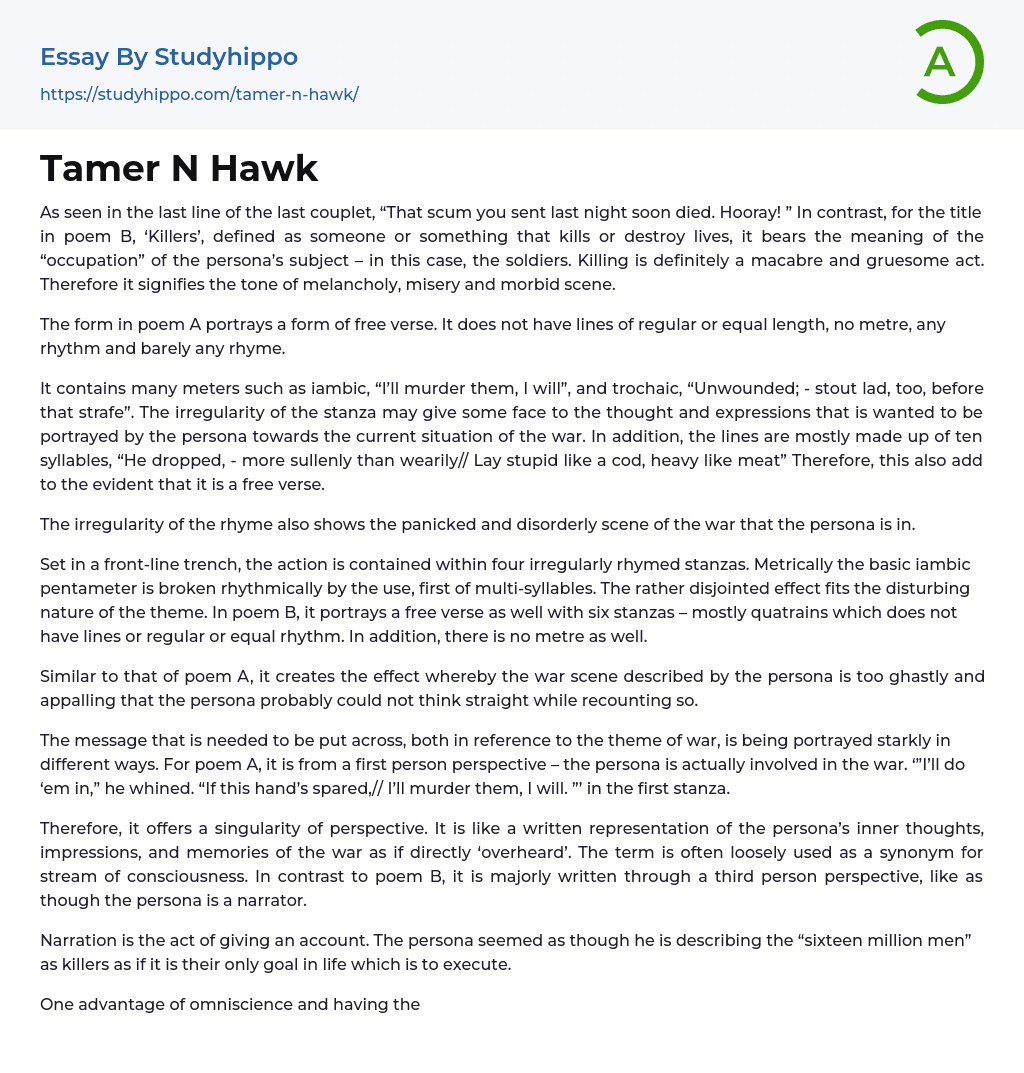As seen in the last line of the last couplet, “That scum you sent last night soon died. Hooray! ” In contrast, for the title in poem B, ‘Killers’, defined as someone or something that kills or destroy lives, it bears the meaning of the “occupation” of the persona’s subject – in this case, the soldiers. Killing is definitely a macabre and gruesome act. Therefore it signifies the tone of melancholy, misery and morbid scene.
The form in poem A portrays a form of free verse. It does not have lines of regular or equal length, no metre, any rhythm and barely any rhyme.
It contains many meters such as iambic, “I’ll murder them, I will”, and trochaic, “Unwounded; - stout lad, too, before that strafe”. The irregularity of the stanza may give some face to
...the thought and expressions that is wanted to be portrayed by the persona towards the current situation of the war. In addition, the lines are mostly made up of ten syllables, “He dropped, - more sullenly than wearily// Lay stupid like a cod, heavy like meat” Therefore, this also add to the evident that it is a free verse.
The irregularity of the rhyme also shows the panicked and disorderly scene of the war that the persona is in.
Set in a front-line trench, the action is contained within four irregularly rhymed stanzas. Metrically the basic iambic pentameter is broken rhythmically by the use, first of multi-syllables. The rather disjointed effect fits the disturbing nature of the theme. In poem B, it portrays a free verse as well with six stanzas – mostly quatrains which does not have
lines or regular or equal rhythm. In addition, there is no metre as well.
Similar to that of poem A, it creates the effect whereby the war scene described by the persona is too ghastly and appalling that the persona probably could not think straight while recounting so.
The message that is needed to be put across, both in reference to the theme of war, is being portrayed starkly in different ways. For poem A, it is from a first person perspective – the persona is actually involved in the war. ‘”I’ll do ‘em in,” he whined. “If this hand’s spared,// I’ll murder them, I will. ”’ in the first stanza.
Therefore, it offers a singularity of perspective. It is like a written representation of the persona’s inner thoughts, impressions, and memories of the war as if directly ‘overheard’. The term is often loosely used as a synonym for stream of consciousness. In contrast to poem B, it is majorly written through a third person perspective, like as though the persona is a narrator.
Narration is the act of giving an account. The persona seemed as though he is describing the “sixteen million men” as killers as if it is their only goal in life which is to execute.
One advantage of omniscience and having the persona tell the scene of the war in terms of a third-person perspective is that, this mode enhances the sense of objective reliability, for example, truthfulness, of the war scene. “And the sixteen million are killing . .
. and killing // and killing” depicts how gruesome and morbid a battle could be. Both style and language relate correspondingly
to the structure of each respective poem by shaping the way in which the poem should be treated and the impression it gives of the persona.
Poem A in its unrhymed verse of several irregular stanzas is interesting and comes across to be a fairly panicked and disorganised situation and it also attributes a pessimistic tone to the overall poem in its macabre and gruesome scene.
Poem B, in its irregular structure of six stanzas is less interesting, but powerful in its representation of its theme. Abject in its sullen and mildly patronising in its tone, the poem’s structure leads to an even more serious and contemplative atmosphere to a poem steeped in its wicked tone.
- Boo Radley essays
- Genesis essays
- Richard iii essays
- Alice in Wonderland essays
- On the road essays
- Ozymandias essays
- The Nightingale essays
- Holden Caulfield essays
- Animal Farm essays
- 1984 essays
- A Hanging essays
- Shooting An Elephant essays
- A Tale Of Two Cities essays
- Adventures Of Huckleberry Finn essays
- Arthur Conan Doyle essays
- Brave New World essays
- Characters In Hamlet essays
- Characters In Romeo And Juliet essays
- Desdemona essays
- Diary Of A Wimpy Kid essays
- First-Person Narrative essays
- Frankenstein essays
- Heart Of Darkness essays
- Jane Eyre essays
- Jay Gatsby essays
- King Duncan essays
- Librarian essays
- Little Red Riding Hood essays
- Lord Of The Flies essays
- Silas Marner essays
- The Cask Of Amontillado essays
- The Catcher In The Rye essays
- The Crucible essays
- The Handmaid's Tale essays
- The Reader essays
- Virgil essays
- Wuthering Heights essays
- Candide essays
- Castle essays
- J. D. Salinger essays
- Ulysses essays
- Ethan Frome essays
- In Cold Blood essays
- Outliers essays
- Tuesdays With Morrie essays
- The Art of War essays
- Wife of Bath essays
- Huckleberry Finn essays
- The Lady With The Dog essays
- Great Expectations essays




